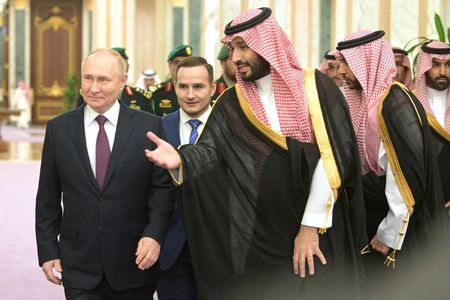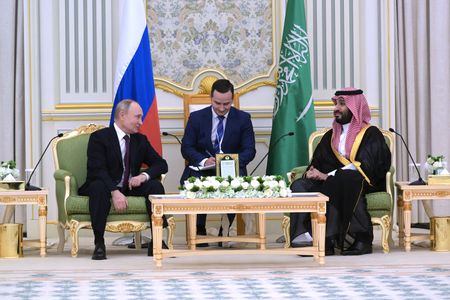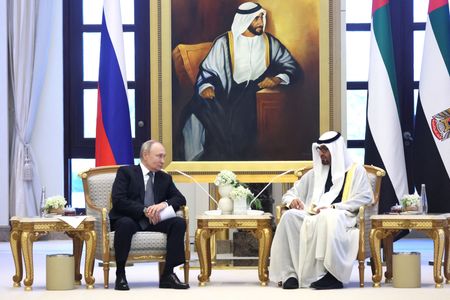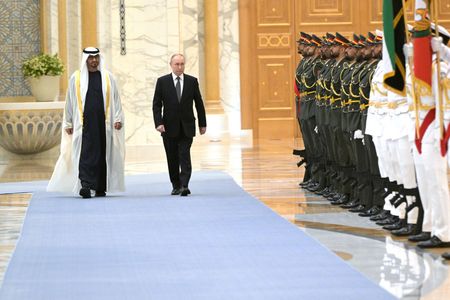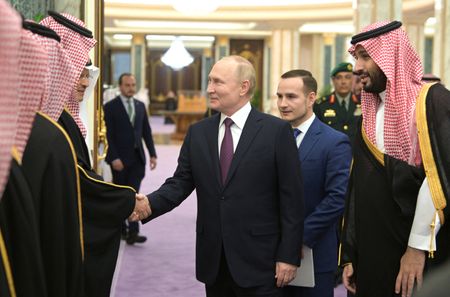By Aziz El Yaakoubi and Vladimir Soldatkin
RIYADH (Reuters) – Russian President Vladimir Putin and Saudi Crown Prince Mohammed bin Salman discussed further cooperation on oil prices on Wednesday as members of OPEC+, a Kremlin spokesperson was quoted as saying.
A Saudi account of the meeting said the crown prince praised joint coordination between the two countries “that helped remove tensions in Middle East”.
Putin and the crown prince, de facto ruler of the world’s largest crude exporter, had the hastily arranged talks hours after the Kremlin leader visited Saudi Arabia’s Gulf neighbour, the United Arab Emirates.
Kremlin spokesperson Dmitry Peskov, quoted by Russian news agencies, said cooperation would continue within OPEC+, which includes the Organization of the Petroleum Exporting Countries (OPEC) and allies led by Russia.
The meeting took place after a fall in oil prices despite an OPEC+ pledge to cut output further.
“We talked again about cooperation in OPEC+,” Interfax news agency quoted Peskov as saying. “The parties agree that our countries bear a great responsibility for interaction in order to maintain the international energy market at the proper level, in a stable, predictable state.”
Putin, who has rarely left Russia since sending troops into Ukraine in February 2022, had also been expected to discuss Ukraine and the conflict in Gaza.
The Saudi Press Agency quoted the crown prince as saying: “We share many interests and many files that we are working on together for the benefit of Russia, the Kingdom of Saudi Arabia, the Middle East and the world as well.”
In remarks at the beginning of their talks, shown earlier on Russian television, Putin thanked MbS, as the crown prince is widely known, for his invitation. He had originally expected him to visit Moscow, “but there were changes to plans”.
Their next meeting should take place in Moscow, he said, and “Nothing can prevent the development of our friendly relations.”
Russia’s defence ministry had earlier shown the Kremlin chief’s Ilyushin-96 aircraft flanked by Sukhoi-35S fighter jets on its flight from Russia to the United Arab Emirates.
Putin’s delegation included top oil, economy, foreign affairs, space, nuclear energy officials and business leaders.
At his first stop in Abu Dhabi, President Sheikh Mohammed bin Zayed al-Nahyan welcomed his “dear friend”, while a fly-past of UAE jets trailed the colours of the Russian flag.
“Our relations, largely due to your position, have reached an unprecedentedly high level,” Putin told him. “The UAE is Russia’s main trading partner in the Arab world.”
Putin said Russia and the UAE cooperated as part of OPEC+, whose members pump more than 40% of the world’s oil, adding that they would discuss the Israeli-Hamas conflict and Ukraine.
His first face-to-face talks with MbS since October 2019 came days after an OPEC+ meeting was delayed over disagreements – superseding what should have been an MbS visit to Moscow.
Putin’s last visit to the region was in July 2022, when he met Supreme Leader Ayatollah Ali Khamenei in Iran. The Russian president was due to host his Iranian counterpart Ebrahim Raisi in Moscow on Thursday.
CLOSE RELATIONS
Putin and MbS, who together control one-fifth of the oil pumped each day, have long enjoyed close relations, though both have at times been ostracised by the West.
At a G20 summit in 2018, two months after the murder of Saudi journalist Jamal Khashoggi in a Saudi consulate, Putin and MbS high-fived and shook hands with smiles.
MbS has sought to reassert Saudi Arabia as a regional power with less deference to the United States, which supplies Riyadh with most of its weapons.
Putin says Russia is locked in an existential battle with the West and has courted allies across the Middle East, Africa, Latin America and Asia amid Western attempts to isolate Moscow.
Both MbS and Putin need high prices for oil, the lifeblood of their economies. The question is how much of the burden each should take on to keep prices aloft – and how to verify their contributions.
Last month, OPEC+ delayed a meeting by several days due to disagreements over production levels. The Saudi energy minister said OPEC+ also wanted more assurances from Moscow that it would make good on its pledge to reduce fuel exports.
Relations between Saudi Arabia and Russia in OPEC+ have been uneasy at times. A deal on cutting exports almost broke down in March 2020, but they managed to make up within weeks and OPEC+ agreed to record cuts of almost 10% of global demand.
(Additional reporting by Yomna Ehab in Cairo; Editing by Alexander Smith, Ron Popeski and Lisa Shumaker)

